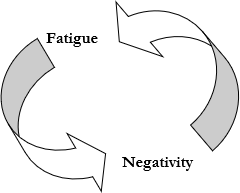Depleted
7/1/2022 12:00:00 AM
Have you ever felt like you were drowning in work and too depleted to do it all? Thought so! Most caregivers feel this way from time to time. We earnestly want to help and, in our desire to do good for others, we sometimes overextend and exhaust ourselves. Caring takes physical, mental and emotional energy, all finite resources
I’ve noticed that a vicious cycle starts when my energy is spent; nothing looks or feels right. I become unsure and anxious; pessimistic thoughts drain away my usual optimism. Negative thoughts weigh on my mind and disturb my sleep. Tired from poor sleep, I have even less energy. Doing anything becomes a chore, which further sours my outlook as I force myself to continue doing the things I feel responsible for doing. What was once viewed positively becomes a burden.

Though I’ve written a book on self-care for caregivers, I’m human. Sometimes I forget to practice what I preach about conserving and restoring energy. When my life gets out of balanced, I recall the advice I’ve given others about ways to avoid feeling depleted.
Recommit to balancing responsibilities, relationships, commitments and energy. Be a good steward of your energy. While engaged in a task, do your best. At the end of the task, the work day or week, let it go. Turn it off. Refocus on other elements of life that are important or fun.
Don’t act like a machine. You’re not an engine that uses an external power source like batteries or electricity to keep going. Not mechanical, your energy is organic; it comes from within. It ebbs and flows and can only be replenished by your choices and behavior. Not limitless, it’s very important to recognize and respond when your energy is running low. Say “no” to over extending yourself. Take a break when you’re tired. Recharge with people and pastimes that bring relaxation, joy, or pleasure.
Avoid stress numbing. Using food, drink, shopping or screen-time to distract, escape, postpone or mute stress provides momentary relief. The problem is, these numb your sense of depletion but don’t restore positive energy. Relying on these can lead to harmful outcomes.
Engage in healthy self-care. These “good-for-you” practices energize, relieve stress, and promote relaxation. Walking, singing, journaling, praying, talking with friends reading, and getting a good night’s sleep are a few examples of ways I restore my energy; what works for you?
If you’re feeling depleted, what can you do to feel better? For some ideas, follow this link to download your Self-Care Checklist. Whatever you do to boost your energy will benefit both you and your care receiver. As you do so much for others, remember to take good care of yourself, too…Jane
Direct Link: https://www.help4cgs.com/Blog.aspx?ID=1&PostID=10